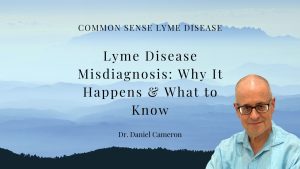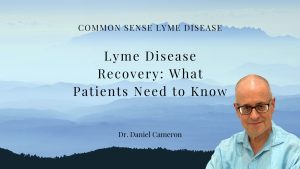
Babesia duncani is no longer just a West Coast problem. In their article “Babesia microti – Borrelia burgdorferi Co-infection,” Parveen reports that B. duncani has now been identified in eastern USA and Canada—areas already endemic for Lyme disease and Babesia.
Babesia Duncani Spreads East
New research indicates there may no longer be a division of babesial strains between the East Coast and the West Coast.
“Since B. duncani is widespread in Canada, its southern spread into northeastern U.S., an area already endemic for Lyme disease, makes co-infections with B. duncani and B. burgdorferi [Lyme disease] a possibility that needs to be carefully investigated.”
“While this review focuses on co-infection with B. microti and B. burgdorferi, there is some evidence that co-infections with a different Babesia species, B. duncani, and B. burgdorferi may be more common than previously suspected,” writes Parveen.
Babesia Duncani Treatment Challenges
The authors raise concerns regarding treatment given that “antibiotics used against B. microti are less effective against B. duncani, making treatment of B. duncani potentially more challenging.”
“Clinical cases caused by Babesia duncani have been associated with high parasite burden, severe pathology, and death,” writes Abraham in The Journal of Biological Chemistry.
Animals fared worse. “In both mice and hamsters, the parasite causes uncontrolled fulminant infections, which ultimately lead to death,” writes Abraham.
Standard Drugs Less Effective for Babesia Duncani
Treatment for B. microti was not as effective for B. duncani in vitro culture, explains Abraham.
“Using this in vitro culture assay, we found that B. duncani has low susceptibility to the four drugs recommended for treatment of human babesiosis: atovaquone, azithromycin, clindamycin, and quinine.”
“These data suggest that current practices are of limited effect in treating the disease [B. duncani],” writes Abraham.
For patients who don’t respond to standard treatment, tafenoquine may be an alternative worth discussing with your physician.
Babesia Duncani Testing Gap
I have diagnostic concerns. B. duncani is not routinely tested for in Canada and the Eastern USA. Individuals with B. duncani may go undiagnosed.
This is particularly concerning because standard Babesia tests typically only look for B. microti. A patient can test negative for Babesia and still have a B. duncani infection.
I have seen evidence of B. duncani in my practice in the Hudson Valley region. The testing gap means we may be significantly underestimating how many patients have this more dangerous species.
What This Means for Patients
If you live in an area endemic for Lyme disease and have symptoms consistent with Babesia—such as night sweats, air hunger, and fatigue—but your tests come back negative, B. duncani may be the cause.
Patients with co-infections involving both Lyme disease and Babesia tend to have more severe symptoms and longer recovery times. When B. duncani is involved, treatment may need to be extended or modified.
Frequently Asked Questions
What is Babesia duncani?
A species of Babesia originally found on the West Coast that has now spread to eastern US and Canada. It can cause severe disease and is harder to treat than B. microti.
Is Babesia duncani harder to treat?
Yes. Standard drugs (atovaquone, azithromycin, clindamycin, quinine) are less effective against B. duncani than B. microti in laboratory studies.
Can you test for Babesia duncani?
It’s not routinely tested for in Canada and the Eastern US. Patients with B. duncani may go undiagnosed because labs typically only test for B. microti.
How dangerous is Babesia duncani?
Clinical cases have been associated with high parasite burden, severe pathology, and death. In animal studies, the infection is often fatal.
Where is Babesia duncani found?
Originally West Coast (US/Canada), but now identified in eastern USA and Canada—areas already endemic for Lyme disease.
References
- Parveen N, Bhanot P. Babesia microti-Borrelia burgdorferi Coinfection. Pathogens. 2019;8(3):E117.
- Abraham A, Brasov I, Thekkiniath J, et al. Establishment of a continuous in vitro culture of Babesia duncani in human erythrocytes reveals unusually high tolerance to recommended therapies. J Biol Chem. 2018;293(52):19974-19981.



Is the test for b. ducani reliable?
I have my concerns. I have not seen reliability data in actual practice.
I was once tested for Babesia duncani at a California Dept of Public Health Lab. Everyone was shocked it came back positive given I’d been infected on the East Coast. The lab director who seemed quite competent swore up and down that this test is accurate and that duncani is a very different species than microti (true). He said there couldn’t possibly be cross reactivity between the two organisms. I did find him believable. The test was repeated and came back positive again. This was back around 2001, so arguably I must have been one of the early victims of this parasite. But if you are looking for a test for this, you might look to the California Dept of Public Health Lab.
So weird. I believe I was infected in the state of Washington…in the Chuckanuts(foothills) outside of Bellingham. I didn’t think that, until I was talking to my next door neighbor…he was always working on his landscaping. Suddenly, his yard wasn’t looking as beautiful…we were talking one day. He told me he was dealing with Babesia Duncani, and he was exhausted. I told him I was diagnosed as well. I don’t know where he was tested, but we both seemed to have been infected that same spring. He was using a lot of herbals as the medication recommended did nothing. My situation is that I’m allergic to that whole class of antibiotics used to treat the infection. I was on Malarone for along time, but my last test(I now live in a different state) shows the infection is worse. Not really sure there is anything else that can be done, as long as most medical establishments could care less. Clinics that actually treat Lyme and co-infections around here are shysters.
Babesia Duncani was initially diagnosed on the west coast of the USA. I have patients in USA also test positive for Babesia Duncani. The challenge is to determine if it is a true positive.
Interesting. I always thought LLMD doctors find IGENEX testing the most reliable. I’ve tested positive for Duncani twice. Is it because you don’t know a treatment, that you are challenging their testing methods? Wow! I guess I don’t hold out for healing from this.
I have been diagnosed with B. Duncani twice. I live in NYC, travel north on the summer only. I believe I’ve had it with me for many years & is only showing it’s ugly face now. Seem to be responding to Malarone & Mepron, but symptoms come back within 36 hours of stopping the medication. Doing this for 3 months.
I have a similar experience in some patients in my practice.
How are you treating Duncani if Malarone & Mepron dont seem to kick it?
I have had the same issues with Babesia microti. Sometimes I need to make sure other tick-borne infections are being treated. I have to make sure there is no other illness. I have tried clindamycin and quinine in a few cases. I have always had an interest in Flagyl or Tindamax as they work for parasites.
I tested positive for Babesia Duncani and I believe I contracted it in Northern VA. My doctor have me do 30 days of Mepron and Azithromycin. I then did 3 days of heavy Tinidazole/Tindamax. Im now starting my 2nd round of Mepron and Azithromycin. Has anyone had success with this regiment?
I’m wondering the same thing.
My daughter is 12 and has tested positive for b.duncani. She was born in Fl and we have lived in NC since she was 5 months old. We have never been to the west coast so it’s definitely in the east. I’m looking for a good LLD here. She has also tested positive for borrellia miyamotoi.
I don’t think anyone knows. The Malarone and antibiotics don’t work. I tried this for a long time, but I’m allergic to the antibiotics that end with “mycin”. In my last IGENEX test this year, the B. Duncani went from 60 to 90, and I have another Borrelia infection called B. Hermsii. if I thought doctors were clueless before, now they are just completely uneducated about these infections.
The tests are not as reliable as I would like no manner who is running them. I find it important to include a reevaluation for another illness
With B. Duncani would you typically find muscle pain/burning, exhaustion and elevated lactate levels (flu like symptoms but no fever)?
I find it hard to be sure what tick borne infection is the cause of symptoms. I also check to make sure another illness is the cause
Henry, Chris,
I had B. duncani and B. burgdorferi for years without fever or any other typical blood indicator of infection. I first tested positive for Babesia by smear then by antibody for B. duncani (after the cure). I was successfully treated with Mepron and Azithromycin but it took several (3) treatments. There is NO reason to be parsimonious with antibiotics when treating tick borne illness so if your doctor has those propensities, find another. When you are cured, you will know it.
How are you doing now Joel? I start treatment tomorrow for same thing
So what is an effective treatment for Babesia Duncani?
I start my patients with the same medications I use for Babesia microti e.g. azithromycin and atovaquone. I hope this research into Babesia duncani offers new insights.
Kathleen,
I’m from PA and experienced a very similar situation as you, but that seems to be the norm when dealing with infectious disease specialists and tick borne diseases. I’ve always been really fit and healthy, then some strange things started happening out of nowhere that ramped up over a 3 year period. Then one day I developed severe afib, and was off to the hospital by ambulance. A huge list of other symptoms grew from there (POTS, panic attacks, sweats, palpitations, head pain, unstable BP, tinnitus, air hunger, fevers, vertigo, etc.). I’m not sure how I survived summer 2020. Eventually I came to terms that the medical system wasn’t going to help me, and turned to my own research. I sincerely thank Dr. Daniel Cameron and Dr. Wayne Anderson for putting babesia on my radar, as I had never heard of it before… but their articles made more sense of my symptoms than anything else I was considering (cancer, lupus, MS, brain tumor, etc.). The information they posted may have very well saved my life. My condition progressively worsened, and I was several weeks bedridden before finally starting treatment with an LLMD. Initial IGeneX testing showed positive for Lyme and babesia sp. were visible on blood smear but no microti or duncani antibodies were detected. Within 3 days of starting malarone + azithromycin, I was 50% better and could start walking around the house… and start interacting with my wife and young kids again. Unfortunately, after about 2 months the malarone effectiveness seemed to decrease, and at 4 months it was obviously not working anymore. I was switched to primaquine, hydroxychloroquine, tinidazole (4 days on, 3 days off), and ceftin. I stayed on that combo for 6 months and my issues resolved one by one… and stayed gone. Babesia became undetectable on (>30 minute) blood smear inspections, but repeat IGeneX testing now showed positive IgG antibodies for duncani. The Lyme ImmunoBlot turned negative. New IGeneX testing showed I also have IgM and IgG antibodies to bartonella, and my RTL urine test was highly positive for multiple types of mycotoxins… so I still have some things to deal with. Today I’m feeling about 90% recovered… but some milder head pain, tinnitus, and intermittent vertigo remain. Babesia duncani was my worst infection, and it was a huge fight beating it back. If your ID docs in NH are like the ones in PA… I can’t stress strongly enough the importance of finding a good LLMD.
BTW, my liver was affected by this. I was diagnosed with NAFLD with no plausible explanation. The liver damage even showed up on my first CT scan the day of afib. Follow up testing showed my liver is now completely healed after a year of treating tick borne infections.
I read all of what you wrote and realize this was a year ago that you posted. I am looking for answers for my 17 yr old. Pediatrician is of NO help and I have tested her for EVERYTHING. A tick borne panel was done in Dec of 2021 and showed equivocal results which the pediatrician didn’t blink an eye at. Since then, I have come to know that there is Babesia Microti and Babesia Ducani. She was only tested on the panel for Microti. She has had severe fatigue, weight loss, hair loss, severe hormonal imbalances, panic attacks, headaches…you name it. We are a family that travels to Central America quite often and we live in the Northeast. I am wondering how your gut fared with all of the antibiotics you took and if you ever considered any herbal treatments in lieu of the antibiotic route. Also how were you eventually diagnosed? Was it all thru bloodwork? Reason I am asking is because I am reading that a negative result, does not necessarily mean infection isn’t present. Thank you for any response…….
That is a wild story Dan. I too live in PA and our stories are extremely similar. I was fit and healthy, then got a tick bite one day. Five days later I had the highest fever of my life and almost got hit by a car on my way into the doctor’s office I was so out of it. I told the doctor about the tick bite and was told that I probably have the flu, I had never had the flu in my life at that point and dismissed it, flu test was negative. I then repeated to the doctor that I had pulled a tick off myself five days earlier. He seemed reluctant, but put me on 10 days of doxycycline, and I felt much better very quickly.
Years went by and symptoms started creeping in that I did not understand. Fatigue was the first, I thought I needed more exercise and stricter diet, both of which seemed to make me feel worse. I saw dozens of doctors and got the same ” your bloodwork looks good.” again and again. Then came the chest pain and palpitations, saw a half dozen cardiologists, then boom AFIB and a ambulance ride to the ER. All the symptoms you name and then some over the years, and then finally bed ridden. Fatigue that I can only explain as “If the house were burning down around me, I would just lay there and burn with it.” Finally I met an LLMD that was willing to treat me. It took 3.5 years of treatment and being on 3 antibiotics and an antiparasitic at the same time, but I felt much better, however symptoms would always come and go and I feared they would someday come back, and they have. I am not nearly as bad as I was years ago, but I did not wait and sought treatment from my LLMD before things got out of hand. This time we ran the full tick bourn illness battery of tests, and I was positive for both Lyme and Babesia. I hope with this new information me and my doctor can come up with a good game plan and knock this out for good. It has stolen over a decade of my life, in what is supposed to be my prime, and I am beyond tired of these diseases.
Good luck to all.
How long do you typically treat? I tested positive for B. Duncani recently (Virginia) with no other parasite found. It’s complicated by chronic reactivating EBV. My doctor initially prescribed hydroxychloroquine, atovaquone, and azithromycin (21 days on, 10 days off x 3 cycles). I have found I’m completely intolerant to the hydroxychloroquine, so that’s been removed. Herx is tough on this. Is there anything I should ask in regard to other research? I haven’t found mych except for this site.
I find every patient in my practice challenging. I have not supported pulse or cyclical therapy.
How long do you typically treat? I tested positive for B. Duncani recently (Virginia) with no other parasite found. It’s complicated by chronic reactivating EBV. My doctor initially prescribed hydroxychloroquine, atovaquone, and azithromycin (21 days on, 10 days off x 3 cycles). I have found I’m completely intolerant to the hydroxychloroquine, so that’s been removed. Herx is tough on this. Is there anything I should ask in regard to other research? I haven’t found mych except for this site.
My husband pulled a tick off of him in October. 2 weeks later he scheduled an appt. with his PCP to get a Lyme test. His doctor took a look at him and sent him to the ER, where he was admitted as an inpatient for five days due to the fact he was in liver failure. The second day of his hospital visit I asked the team to test him for babesiosis. After 10 hours of advocating for this test and telling them the test needed to be sent to a speciality lab, the did test him, but in their own lab. His test came back negative.
We have been going through four months of pure hell with his team of doctors dismissing the idea of him having babesiosis, so I purchased a kit from igenex.com. It came back positive for babesia duncani on Feb 23rd. We were finally validated and he was referred to an infectious disease specialist who did not see the specialty lab results, only the initial negative ones, and told us he was sure my husband did not have babesiosis. When he finally received a copy of the positive lab results, he was surprised and wanted to know how my husband “picked up a West coast parasite”. After telling him we did not travel to the west coast and that he was bitten by a tick in our back yard in New Hampshire, he finally prescribed us with the treatment for babesiosis, but STILL thinks the liver failure and the babesiosis are not related.
This has been beyond frustrating and it feels like we are fighting for his life daily and no one will treat this seriously.
I’m just here to share this story and see if anyone else in the NH area has experienced something like this. According to what I have read babesia duncani has been on the East coast since approx. 2018. How are doctors here not up to date on babesiosis??
Kathleen, sorry to hear what you have been up against. I believe that the 2 times I got bit it was on the East coast (I live in CT). I tested positive for both duncani and microti. Seems only LLMD’s like Dr. Cameron are up to date and knowledgeable of this. Sadly, I know not everyone can afford to pay up front (then submit to insurance risking it won’t be covered). But I believe there is a big difference in the treatment you will get from someone Lyme Literate.
Dx with B. Duncani, Bartonella, and Lyme. It’s been over a year with no relief from Chronic Fatigue, Peripheral Neuropathy and Anemia. Been on Zithromax, Mepron, Mamaroneck for 8 weeks and Bactrim for 3 weeks. No improvement, only getting worse. See Hematologist next week.
I tested positive (IgG, Igenex) for B. duncani in 2007 two years after treatment with Mepron. I tested negative (IgG/IgM, Igenex) in 2005 for B. microti but my Lyme doctor treated me anyway. Mepron apparently worked for me; isn’t it the same as Atovaquone?
A blood smear by Lida Mattman’s lab in 2000 showed Babesiosis in my blood cells using elecron microscopy, which doesn’t distinguish between species. I am from Maryland and had been to California one time… in 1985 while serving in the Navy. I attended SERE school in the mountains of SoCal for 1-2 weeks. My babesiosis in 2000 was presumed to be microti; I’d contracted Lyme in 1991 and initially I assumed coinfection at that time with microti. I didn’t get positive Lyme results until 2000 and had successful treatment for both by 2005 but didn’t realize it was duncani until 2007.
thanks for sharing.
I am from NH. My test just came back positive for Babesia duncarni (more recent infection), Anaplasmosis (more recent infection), Bartonella Henselae (old infection), and Borrelia Burgdorferi (old infection). This was my first time having a Lyme test because of all of the strange and frustrating symptoms I have been dealing with. It is concerning to know that my system is dealing with all of these infections at once. We are treating the Babesia first with Atovaquone and azithromycin for 10 days, and then we are going to switch to herbal approach, possible UV blood treatment, and also tackle the other infections. I am wondering if the other infections make it more difficult to find complete resolution of Babesia and vice versa. Thoughts/experiences?
My 35 yo daughter has had Lyme disease and Babesia Duncani for over 15 years verified by testing with IGENX. The Lyme disease shut down her digestive system and she has been on TPN since then. She is using IV Clindamycin and Quinine as a treatment for the Babesia which helps but does not cure. We flew from FL many years ago to see you in NY but you said at that time you could not help her. Since then her hemoglobin can drop very fast and she has had over 250 units of blood so far. After a blood exchange she went 5 years without needing a transfusion but then recently started needing them again. Her hemotologist does not understand this disease and doesn’t want to do another blood exchange even though the previous one, which was authorized by his PA when he was out of town, helped so much. My daughter’s PCP believes this would help her but the hemotologist refuses, saying there is no hemolysis in her blood when her Hgb drops so he won’t do it. I don’t know why this is the case but wish someone who is studing this disease would take an inerest and find out why so they can help her and others who might have this unusual symptom.